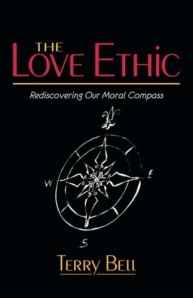Archive for April, 2009
{ April 23, 2009 @ 1:54 am }
·
{ "The Love Ethic", Ethics, Morality, Philosophy, theology, Uncategorized }
{ Tags: " "The Golden Buddha, " Bangkok, "The Love Ethic", Bernard of Clairvaux, Buddha, Burmese Army, M.C.D'Arcy, Philosophy, psychology, self, self-love, Smiling Buddha, Terry Bell, theology } · { }
 If you ever go to Bangkok I recommend you take the “Golden Buddha Tour.”
If you ever go to Bangkok I recommend you take the “Golden Buddha Tour.”
The Temple of the Golden Buddha was discovered in 1957. It is a 10 1/2 feet tall, smiling Buddha made of clay, or so they thought. It was being moved to make way for a new highway. When they lifted it, much to the great consternation of the monks, it cracked. Upon closer investigation, one of the monks saw something glimmering down inside the crack in the clay. Taking a screwdriver the monk began chipping away at it. Soon he discover the real treasure beneath all the clay. To everyone’s surprise, the real buddha underneath was made of solid gold. No one knew about this.
200 years earlier the Burmese army invaded Thailand. In an effort to keep the Buddha from being stolen, they covered it with a thick layer of clay. The problem was, the Burmese army killed everyone, so no one knew the secret.
Here’s another secret that few people really know:
Underneath our clay bodies there is a SELF more precious than all the gold in the world. Many people do not know this secret.
Maybe this is the reason some people find it so hard to love. Jesus said “love your neighbor as your self.” When we think of our selves as only bodies made of clay, really, what is there to love, either in our own self, or in other selfs.
I love what M.C.D’Arcy wrote:
“The self, then, senses itself in two ways; it feels lovingly towards its own ego, and it feels its derivativeness, that it bears the name of Another imprinted on it. If a melody could be conscious of it own beauty we might suppose that it could both admire itself and think of itself as being nothing more the the expression of a master musician.”
A twelfth century monk by the name of Bernard of Clairvaux outlined a Christian approach to learning the secret of loving one’s self. It progresses like a ladder.
1. Love of self for self’s sake.
2. Love of God for self’s sake.
3. Love of God for God’s sake.
4. Love of self for God’s sake.
© [Terry A Bell] and [The Love Ethic], [2009]. Unauthorized use and/or duplication of this material without express and written permission from this blog’s author and/or owner is strictly prohibited. Excerpts and links may be used, provided that full and clear credit is given to Terry Bell and [The Love Ethic] with appropriate and specific direction to the original content. “The Love Ethic: Rediscovering Our Moral Compass” may be purchased at many book stores and most internet book sites.
{ April 16, 2009 @ 2:53 am }
·
{ "The Love Ethic", Ethics, Morality, Philosophy, theology, Uncategorized }
{ Tags: Abilene, Abilene Christian University, Agape, Amph, Amphictyonic League, Catholic Church, church politics, deconstructive disengagement, Harding Graduate School of Religion, Hillcrest Church of Christ, Love, Martin Noth, ministers, pastors, Seminary, sexual addiction among clergy } · { }
 Actually the subtitle is a bit too presumptuous. No book was ever made that could contain all of that. And as far as graduate schools of religion are concerned, I went to one of the best, Harding Graduate School of Religion in Memphis Tennessee. But while I graduated well-prepared for developing homilies and fighting heresies, I was not prepared for life in the shadow of the pulpit. Yes, it was good for me to learn Greek and discover the mysteries of the Amphictyonic League as presented by Martin Noth … but what about Life?
Actually the subtitle is a bit too presumptuous. No book was ever made that could contain all of that. And as far as graduate schools of religion are concerned, I went to one of the best, Harding Graduate School of Religion in Memphis Tennessee. But while I graduated well-prepared for developing homilies and fighting heresies, I was not prepared for life in the shadow of the pulpit. Yes, it was good for me to learn Greek and discover the mysteries of the Amphictyonic League as presented by Martin Noth … but what about Life?
Actually I was never introduced to the fact that out there just waiting for me, would be powerful enemies, mostly sitting in the pews. I never was taught much about how to handle my mind when integrity issues hit or when critics fired their cannons (or canons), or how to survive church leadership or how to live above it all by constructive disengagement. Much was said about how to tell others to live; little was said to help me know how to live in the bubble of church politics.
I would especially like to have been warned about the mask. Most preachers wear one. It even gets a little lighter as the years go by and we become accustomed to hiding our real selves. It is the mask that protects us from people ever really knowing us. You see, if they ever really get to know us, they may not respect us. And worse yet, they may quit loving us. And for many of us, I suspect, that’s one of the reasons we answered the call … to find love.
Most love that I’ve seen in our churches is conditional love! I wish, as a young seminarian I would have been taught that. Instead, I learned how to read Greek.
The mask accounts for a lot of ministerial shenanigans. Because a lot of minister tend to stay hidden, they have this inner drive to be known for whom they really are. This is why sexual addiction among clergy is so high. It is simply an attempt to medicate the pain that comes from wearing the mask. The Catholic Church has found this out in a big way. But while they’ve been the ones in the spotlight, they certainly don’t have a franchise on the issue of the mask.
Agape is the only real answer to the mask; from both sides of the pulpit, from both clergy and parishioner. Agape allows me, even forces me to love even those who would use and exploit me. It forces me to even love my self, and even work with the darkness within. Unfortunately, for many, the command to even love our enemy, is the same command as the one that says, “love your self.”
© [Terry A Bell] and [The Love Ethic], [2009]. Unauthorized use and/or duplication of this material without express and written permission from this blog’s author and/or owner is strictly prohibited. Excerpts and links may be used, provided that full and clear credit is given to Terry Bell and [The Love Ethic] with appropriate and specific direction to the original content.
{ April 9, 2009 @ 1:58 am }
·
{ Uncategorized }
{ Tags: Crosby Stills and Nash, Garden of Eden, home, postpartum, separation anxiety, Symbiosis, the Fall, Woodstock } · { }
While the analogy of the Garden of Eden as a womb for humanity is not a perfect one, it does provide for us a way of looking at our earliest human habitat, our quintessential homestead. There is something about the word “home”, that resonates deeply within each of us. For those whose first earthly nest was one of love and peace, there are heartfelt memories that are cherished for a lifetime. For others raised in a dysfunctional home, there is a longing deep within to know what was missed … what a true home would be like.
In the deep recesses of our preconscious there is a collective longing among all human beings for our first home, the Garden of Eden. Though it was a home where none of us lived, it remains in our mind as a kind of phantom calling us back. That first home was in a Garden. The first man was absolutely ONE with God. His life was sustained, nurtured, and protected by his Father, his Maker.
A mother’s womb is a human’s first home. In the mother’s womb, the pre-born child and the mother are essentially one. The child is fully dependent on every aspect of the mother’s life-support system. There is a symbiotic relationship. Symbiosis means “living together” (sym meaning, together, and bios meaning, life). In the case of the unborn child, it means much more than just physical proximity, it means total physical dependence. The unborn child is completely and utterly a contingent being whose life in every aspect is provided by the mother.
Then the child is born. Some mothers experience a postpartum depression. Notice the word “postpartum.” It literally means “following a separation.”
As the baby begins to grow and produce a personal past, there is an evolving sense of something absent. In the unfolding future there is the developing notion, at first only a shadowy anxiety, of impending death over which there is no personal choice.
This is the existential plight of every human.
The advent of this separation between mother and child is the beginning of a life of trying to once again find the feeling of Oneness. All of our fears, frustrations, anxieties, guilt and distress, are a result of this unconscious feeling of separation.
I wonder if that is what Crosby, Stills, and Nash meant when they sang:
“We are stardust,
We are golden,
And we’ve got to get ourselves
back to the Garden.”
(quoted from the Love Ethic: Rediscovering our Moral Compass, by Terry Bell, Advantage Books)
© [Terry A Bell] and [The Love Ethic], [2009]. Unauthorized use and/or duplication of this material without express and written permission from this blog’s author and/or owner is strictly prohibited. Excerpts and links may be used, provided that full and clear credit is given to Terry Bell and [The Love Ethic] with appropriate and specific direction to the original content.
{ April 8, 2009 @ 12:54 am }
·
{ Uncategorized }
{ Tags: "The Love Ethic", estrangement, Ethics, Garden of Eden, pain, Philosophy, Rene Descartes, theology } · { }
 The hurting began with the events that led to the expulsion from the Garden. The recent history of philosophy has been consumed with the debate between essence (body) and existence (being). This seemingly erudite disagreement has many implications for the Christian faith. Are humans strictly an essence, that is, a material body with no spiritual dimension? Or is there perhaps a spiritual dimension to our humanness.
The hurting began with the events that led to the expulsion from the Garden. The recent history of philosophy has been consumed with the debate between essence (body) and existence (being). This seemingly erudite disagreement has many implications for the Christian faith. Are humans strictly an essence, that is, a material body with no spiritual dimension? Or is there perhaps a spiritual dimension to our humanness.
A 17th century French mathematician and philosopher, Rene DesCartes, set himself to the goal of doubting everything until he could obviously find something that he could not legitimately doubt. He could doubt the world around him because it might be an illusion or a dream. he could even doubt the existence of his own body because a demon may be deceiving him him.
But one thing he could not doubt was the fact that he was doubting… that he was thinking. Then came his famous saying, “I think therefore I am,” or in Latin, “cogito ergo sum.”
Hunter Guthrie has revised this statement in this fashion: Inquietus, ergo sum,” or I am “restless, therefore I am.” Restlessness is a kind of pain, a hurt. It is the human groan. And it has to do with the loss of Oneness that occurred as the first humans were driven out of the Garden.
(From the Love Ethic: Rediscovering Our Moral Compass,” by Terry Bell).
{ April 7, 2009 @ 2:29 am }
·
{ "The Love Ethic", Ethics, Morality, Philosophy, theology, Uncategorized }
{ Tags: Agape, diving, sharks, Terry Bell } · { }
 A diving instructor opened his first day of lessons by giving a speech on “how to survive a shark attack.” His eager listeners paid close attention. “If two of you are diving together (and you should always dive with a buddy) go to the bottom and sit back to back. As the shark circles, pull out your knife and stare the shark in the eyes.
A diving instructor opened his first day of lessons by giving a speech on “how to survive a shark attack.” His eager listeners paid close attention. “If two of you are diving together (and you should always dive with a buddy) go to the bottom and sit back to back. As the shark circles, pull out your knife and stare the shark in the eyes.
At just the right moment, just before the shark attacks, turn quickly around and cut your buddy’s air hose. Remain still for a minute or so. Then, when the shark is focused on your buddy’s escape, swim like crazy.” This story would be funny if it weren’t so true in regard to our everyday behavior.
When it all comes down to it, there are basically two domains in the world. One is the domain of the sharks, characterized by self-enhancement and self-preservation. The other is the Kingdom of God; the essence and life-force of this Kingdom is Agape.
The great poet, Shelly, saw human rejuvenation rooted in love. “The great secret of morals is love; or a going out of our own nature and an identification of ourselves with the beautiful which exists in a thought, action, or person not our own” (Defense of Poetry).
(quoted from the Love Ethic: Rediscovering our Moral Compass, by Terry Bell, Advantage Books)
© [Terry A Bell] and [The Love Ethic], [2009]. Unauthorized use and/or duplication of this material without express and written permission from this blog’s author and/or owner is strictly prohibited. Excerpts and links may be used, provided that full and clear credit is given to Terry Bell and [The Love Ethic] with appropriate and specific direction to the original content.
{ April 5, 2009 @ 3:40 am }
·
{ Uncategorized }
{ Tags: "The Love Ethic", Agape, Ethics, God's love, human beings, medical ethics, Philosophy, theology } · { }
 I’m sad to say that classical ethics is not a very high priority in the curriculum of most medical schools today. Medical Ethics is mostly relegated to the subject of “How not to get sued.”
I’m sad to say that classical ethics is not a very high priority in the curriculum of most medical schools today. Medical Ethics is mostly relegated to the subject of “How not to get sued.”
It seems like a cliché to say that our technological abilities have certainly outstripped our moral thinking. Morality is like the sophisticated navigational system on a very powerful missile. You can have lots of power (thrust) but if you can’t direct it, there can be a lot of needless damage.
Only humans have the capacity for Agape. Agape applies the strength of “unconditional love” even in very complex problems. It is based in the very nature of God Himself. It recognizes the intrinsic value of human beings. That value comes not from a person’s ability to be productive; on the contrary, it comes because God invests value in us.
We are not loved by God because we are valuable. We are valuable because God loves us.
© [Terry A Bell] and [The Love Ethic], [2009]. Unauthorized use and/or duplication of this material without express and written permission from this blog’s author and/or owner is strictly prohibited. Excerpts and links may be used, provided that full and clear credit is given to [Terry Bell] and [The Love Ethic] with appropriate and specific direction to the original content.
{ April 3, 2009 @ 3:14 pm }
·
{ "The Love Ethic", Ethics, Philosophy, theology }
{ Tags: "The Love Ethic", "The Patriot", Agape, Ethics, Love, North Star, Paul Tillich, Relativism } · { }
 Paul Tillich said “Agape is the absolute moral principle, the ‘star’ above the chaos of relativism.”
Paul Tillich said “Agape is the absolute moral principle, the ‘star’ above the chaos of relativism.”
The ethics of “relativism” is also the ethics of “absolutism.” To say “all ethics are grounded in relativism” is to make an absolute statement. It becomes a Zeno’s Paradox. It refutes itself.
Chaos is the result of relativism. In Mel Gibson’s movie, “The Patriot,” there is a dramatic moment at the end where Gibson gives his recently widowed daughter-in-law a neckless. His words say it all:
“I have something for you.
It belonged to Gabriel’s mother.
It’s the North Star.
It’s the only star in the sky that doesn’t move.
It’s constant…unwavering..a guide.”
In my book, “The Love Ethic: Rediscovering Our Moral Compass” I’ve tried to show that our North Star today is AGAPE, “God’s love.” It is not the Bible, though the Bible is it’s revelation. The Bible is the finger that points to it. The finger that points to the star, is not the star.
© [Terry A Bell] and [The Love Ethic], [2009]. Unauthorized use and/or duplication of this material without express and written permission from this blog’s author and/or owner is strictly prohibited. Excerpts and links may be used, provided that full and clear credit is given to [Terry Bell] and [The Love Ethic] with appropriate and specific direction to the original content.
{ April 3, 2009 @ 2:24 am }
·
{ Uncategorized }
{ Tags: "The Love Ethic", Family Guy, gay, Gay Marriage, homosexual, Simon Levay, urban legends } · { }
 In my Thursday evening Philosophy we explored the intricacies of “The Family Guy.” Now I’ve not seen it so please don’t take this as a recommendation. The topic we were really discussing was the issue of Tabula Rasa, the blank slate.
In my Thursday evening Philosophy we explored the intricacies of “The Family Guy.” Now I’ve not seen it so please don’t take this as a recommendation. The topic we were really discussing was the issue of Tabula Rasa, the blank slate.
I was informed by my class that the family guy participated in a medical study in which he was required to take a “Gay Gene Shot.” After that, he became totally gay, proving that being gay is genetic.
Please don’t think this is another “gay bashing blog.” It is not. But there is an urban legend going around that says that it has been proven that homosexuality is determined by genetics. To set the record straight, that is not the case. Check out the three primary studies on this issue. The earliest and most important was conducted by Simon Levay. Dr. Levay has become so upset about people turning his study into an urban legend that, in an attempt to set the record straight (no pun intended), he has stated “It’s important to stress what I didn’t find. I did not prove that homosexuality is genetic, or find a genetic cause for being gay. I didn’t show that gay men are born that way, the most common mistake people make in interpreting my work.”
Now I’m going to love you anyway, no matter who you are. But let’s get our facts straight. One of our biggest urban legends out there is that there is a Gay Gene. Check the primary sources. Then you decide
© [Terry A Bell] and [The Love Ethic], [2009]. Unauthorized use and/or duplication of this material without express and written permission from this blog’s author and/or owner is strictly prohibited. Excerpts and links may be used, provided that full and clear credit is given to [Terry Bell] and [The Love Ethic] with appropriate and specific direction to the original content.
{ April 2, 2009 @ 9:11 pm }
·
{ Uncategorized }
{ }
First Blog. A year ago I didn’t even know what a blog was. Now I have one. What a deal. Future Shock is a reality. I still can’t figure out Twitter…but that’s my next adventure. Love to have you join me on this blog. Mainly we’ll be talking about ethics, theology, philosophy…and whatever else may show up. Welcome aboard…to my brand new day.
 If you ever go to Bangkok I recommend you take the “Golden Buddha Tour.”
If you ever go to Bangkok I recommend you take the “Golden Buddha Tour.” Actually the subtitle is a bit too presumptuous. No book was ever made that could contain all of that. And as far as graduate schools of religion are concerned, I went to one of the best, Harding Graduate School of Religion in Memphis Tennessee. But while I graduated well-prepared for developing homilies and fighting heresies, I was not prepared for life in the shadow of the pulpit. Yes, it was good for me to learn Greek and discover the mysteries of the Amphictyonic League as presented by Martin Noth … but what about Life?
Actually the subtitle is a bit too presumptuous. No book was ever made that could contain all of that. And as far as graduate schools of religion are concerned, I went to one of the best, Harding Graduate School of Religion in Memphis Tennessee. But while I graduated well-prepared for developing homilies and fighting heresies, I was not prepared for life in the shadow of the pulpit. Yes, it was good for me to learn Greek and discover the mysteries of the Amphictyonic League as presented by Martin Noth … but what about Life? The hurting began with the events that led to the expulsion from the Garden. The recent history of philosophy has been consumed with the debate between essence (body) and existence (being). This seemingly erudite disagreement has many implications for the Christian faith. Are humans strictly an essence, that is, a material body with no spiritual dimension? Or is there perhaps a spiritual dimension to our humanness.
The hurting began with the events that led to the expulsion from the Garden. The recent history of philosophy has been consumed with the debate between essence (body) and existence (being). This seemingly erudite disagreement has many implications for the Christian faith. Are humans strictly an essence, that is, a material body with no spiritual dimension? Or is there perhaps a spiritual dimension to our humanness. A diving instructor opened his first day of lessons by giving a speech on “how to survive a shark attack.” His eager listeners paid close attention. “If two of you are diving together (and you should always dive with a buddy) go to the bottom and sit back to back. As the shark circles, pull out your knife and stare the shark in the eyes.
A diving instructor opened his first day of lessons by giving a speech on “how to survive a shark attack.” His eager listeners paid close attention. “If two of you are diving together (and you should always dive with a buddy) go to the bottom and sit back to back. As the shark circles, pull out your knife and stare the shark in the eyes. I’m sad to say that classical ethics is not a very high priority in the curriculum of most medical schools today. Medical Ethics is mostly relegated to the subject of “How not to get sued.”
I’m sad to say that classical ethics is not a very high priority in the curriculum of most medical schools today. Medical Ethics is mostly relegated to the subject of “How not to get sued.” Paul Tillich said “Agape is the absolute moral principle, the ‘star’ above the chaos of relativism.”
Paul Tillich said “Agape is the absolute moral principle, the ‘star’ above the chaos of relativism.” In my Thursday evening Philosophy we explored the intricacies of “The Family Guy.” Now I’ve not seen it so please don’t take this as a recommendation. The topic we were really discussing was the issue of Tabula Rasa, the blank slate.
In my Thursday evening Philosophy we explored the intricacies of “The Family Guy.” Now I’ve not seen it so please don’t take this as a recommendation. The topic we were really discussing was the issue of Tabula Rasa, the blank slate.